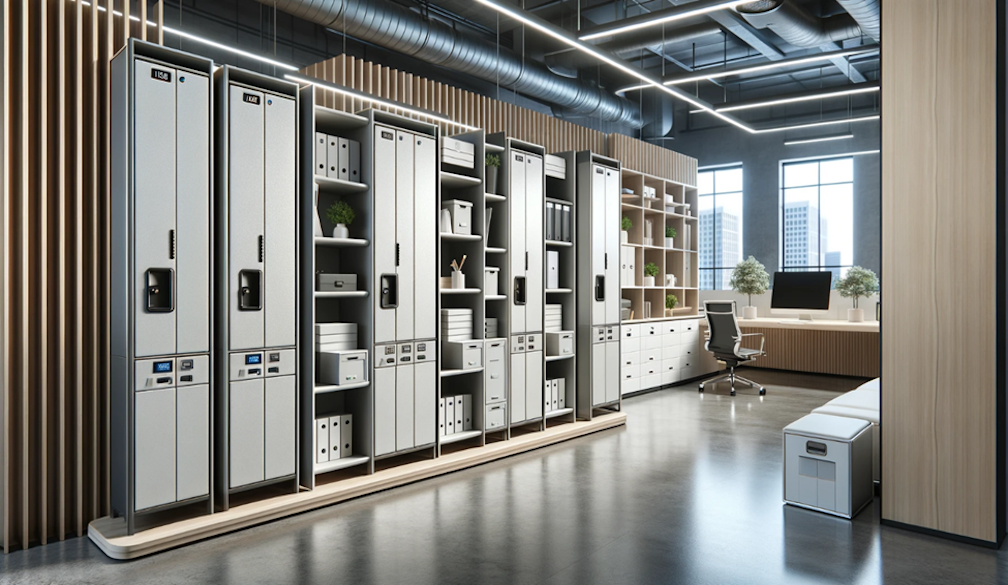The Impact of Lockers on Organisational Productivity and Space Management

When discussing the dynamics of workplace organisation, we must realise that lockers play a pivotal role in enhancing productivity and efficient space management.
Lockers, particularly those offered by industry leaders, cater to a wide array of sectors, including educational institutions, essential services, manufacturing facilities, commercial offices, and hospitality venues.
Boosting Workplace Efficiency
The introduction of smart locker systems has revolutionised locker management; traditional lockers, often managed through manual keys and laborious spreadsheet systems, can lead to high management costs.
In contrast, smart lockers utilise cutting-edge technology to streamline the process, reducing administrative time by up to 94% and allowing managers to focus on more profitable activities.
Impact on Employee Satisfaction and Productivity
Lockers are crucial in agile work environments, providing secure storage for employees, particularly in settings without permanent desks.
Frustrations from locker allocation delays, lost keys, or damaged locks can significantly impact employee satisfaction, affecting workplace engagement and productivity.
Smart lockers, offering contactless access and greater control, have been shown to increase job satisfaction, leading to a 12% increase in productivity for happy employees.
Security and Transparency in the Workplace
Security is a paramount concern in agile work environments with high traffic; traditional lockers are often less secure, posing risks of theft and false loss claims.
Smart locker systems with live analytics and reporting features enhance workplace transparency and reduce security management time, thus protecting valuable business assets and bolstering workplace security.
Streamlining Locker Management for Productivity
Inefficient locker management can be detrimental to productivity, with time lost in allocation, access, and management; this inefficiency can lead to employees missing crucial meetings or training sessions.
Smart locker systems, by streamlining these processes, can instantly boost workplace productivity, ultimately increasing revenue and the bottom line.
Lockers in Various Organisational Settings
Organisations across different sectors have unique needs when it comes to locker solutions; some of them work closely with architects and interior designers to integrate lockers into the artistic vision of new projects.
This collaboration ensures that lockers not only meet functional requirements but also align with the aesthetic and design ethos of the space.
● Educational Institutions
In educational settings, from primary schools to universities, lockers need to withstand heavy use; well-designed, sturdy lockers are essential for students at all levels, providing a secure place for their belongings and contributing to an organised learning environment.
● Essential Services
For essential services such as police, ambulance, and fire brigades, lockers serve as a secure storage solution for critical equipment and personal items.
The reliability and durability of these lockers are crucial in supporting the day-to-day operations of these vital services.
● Manufacturing and Commercial Offices
In manufacturing and commercial settings, lockers play a significant role in maintaining an organised workspace – they provide employees with secure storage for personal and professional items, aiding in decluttering the workspace and improving overall efficiency.
● Hospitality Venues
In the hospitality industry, lockers are essential for staff to securely store personal belongings, helping maintain the professionalism and organisation crucial in such customer-facing environments.
The Future of Locker Solutions
The future of locker solutions lies in further integrating technology to improve user experience; innovations in locker design and management systems are likely to focus on user ergonomics, security, and customisation to meet the specific needs of different sectors.
Innovative Design and Environmental Sustainability
In the domain of locker manufacturing, there is a growing emphasis on incorporating sustainable practices and materials.
Modern lockers are increasingly being designed with recyclable materials and eco-friendly production processes; this shift not only aligns with global environmental sustainability goals but also appeals to the growing demographic of environmentally conscious consumers and organisations.
Moreover, innovative design elements are being integrated into locker systems to enhance user experience and space efficiency: features like modular designs, customisable configurations, and ergonomic elements cater to the diverse needs of users in different organisational environments.
These advancements in design not only improve the aesthetic appeal of lockers but also contribute to better space management, making them a versatile solution in various settings.
In Short
Lockers, evolving with the times, continue to play a crucial role in enriching organisational productivity and efficient space management.
As they become more aligned with sustainability goals and innovative design trends, lockers are set to remain an indispensable part of modern workplace infrastructure, contributing significantly to the functionality and aesthetic of various organisational spaces.


